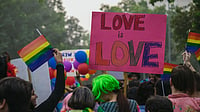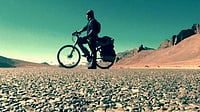What prompted this book? Was it an effort to know Anthony Bourdain better?
This book was conceived very shortly after Tony’s death in June 2018, and it came out of a conversation between myself, Tony’s longtime US editor Daniel Halpern, and his longtime literary agent, Kimberly Witherspoon, who is now my agent as well. We had been fielding all manner of pitches and queries from people wanting to write about Tony, people wanting to make films about him, and people hoping to audition to replace him on television. It was overwhelming, and there was a shared desire to create something that came from a place of already knowing him, as a way to tell the rest of his story, as accurately as possible, and with the permission of his estate.
You spoke to people who knew Tony through different periods of his life. What were your favourite conversations, the most insightful?
I worked closely with him for nearly a decade, and I’d known him for almost 20 years, but each conversation I had for this book revealed something that I hadn’t previously known about Tony – some big revelations, and some minor details. I especially enjoyed talking with Tony’s first wife, Nancy, who had known him since they were young teenagers, and had been with him through high school, college, cooking school and his long career as a chef. She’s a very private person, and also very funny and smart, with an excellent memory for the ways in which Tony changed and grew over the years. I was so pleased that she trusted me enough to open up for this book. I also very much enjoyed speaking with CNN anchor Anderson Cooper, who has spent as much time on the road as Tony did, and understands how that can isolate and change a person. He was also quite forthcoming about the loss of a family member by suicide.

The book doesn’t exalt the chef; in fact, it presents him as imperfect, fallible. How did you decide aspects of his life should make it into the narrative?
Tony was unsparingly honest in writing about himself, especially in Kitchen Confidential, the memoir that kick-started his career as a travel television host and producer, and I felt strongly that I wanted to continue that spirit of honesty in this book. There were so many loving tributes in the immediate aftermath of his death, and I don’t think there’s any doubt that he did a lot of good for the world, but to show only the positive sides of him would not be an honest portrayal of a complex person; it was not how he presented himself, as a saint.
Hopeless romantic, narcissistic, drug addict, charming - these are some of the many ways in which Bourdain has been described in the book. How would you describe him?
I would agree with all of these assessments, and I would add that he was very good at reading a person or a situation and knowing how to respond, to get the result he was after. With some members of his kitchen and TV crews and some network executives, he knew that he had to be very tough in order to get the best work out of them, or to get his way. There were others whom he treated very gently. He was also somewhat shy and socially awkward, which might surprise people who only saw the brash, swaggering side of him on television. He was extraordinarily generous with opportunities. And I don’t think it would surprise anyone to hear that he was extraordinarily intelligent and well-read.

Why have you kept your own memories of the man out of the purview of the narration?
I was interviewed for the book, at the insistence of editor Daniel Halpern, but I reserved the right not to include my own comments if I didn’t find them useful. At the end of the process, I didn’t see any instance where my own anecdotes or memories would have enhanced what was already on the page. And in truth, between the introduction I wrote, and all of the decisions I made about whom to interview, what to ask them, and what parts of the interviews to include and in what order, my input, and my own working knowledge of Tony, is on every page of the book.
What is it about Anthony Bourdain that you want the readers to walk away with?
I hope that people who read this book will have a better understanding of how a person like Tony, who seemed to have everything he ever wanted, could still get to a place where he decided to end his own life. And, I hope that readers will recognize that there was a lot of hard work, a number of dead ends, and a lot of luck and good timing that contributed to the unlikely story of his success.

Is the book, Bourdain in Stories, a form of catharsis? For you, for the people who contributed to it, and the readers?
Yes, I found the process of creating this book to be hugely cathartic, as someone who was directly affected by his death. It was quite useful and comforting to have so many conversations about Tony, with people on whom he had made such a huge impact, from his brother Christopher, his late mother Gladys and his daughter Ariane, to various classmates, colleagues, ex-girlfriends, and the various fascinating friends he picked up along the way. Many of the interview subjects likened our conversations to a form of psychotherapy. And it’s my hope that readers who have felt some pain, anguish, confusion or anger at Tony’s death can find some peace and understanding in reading about the long and fascinating arc of his life.


























